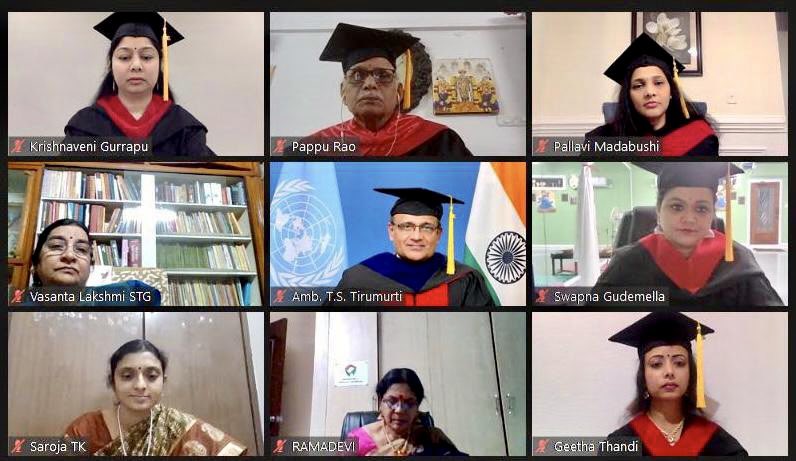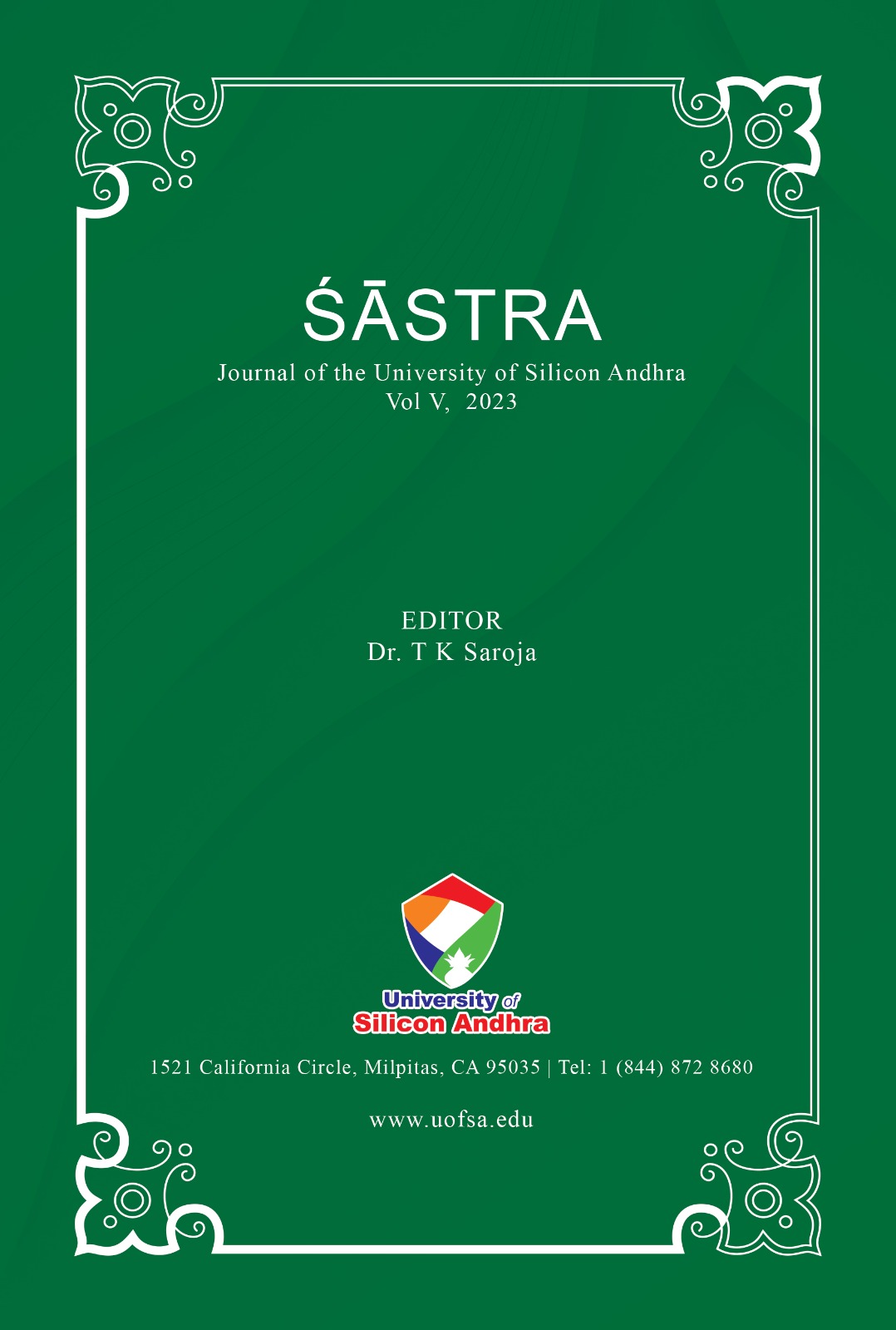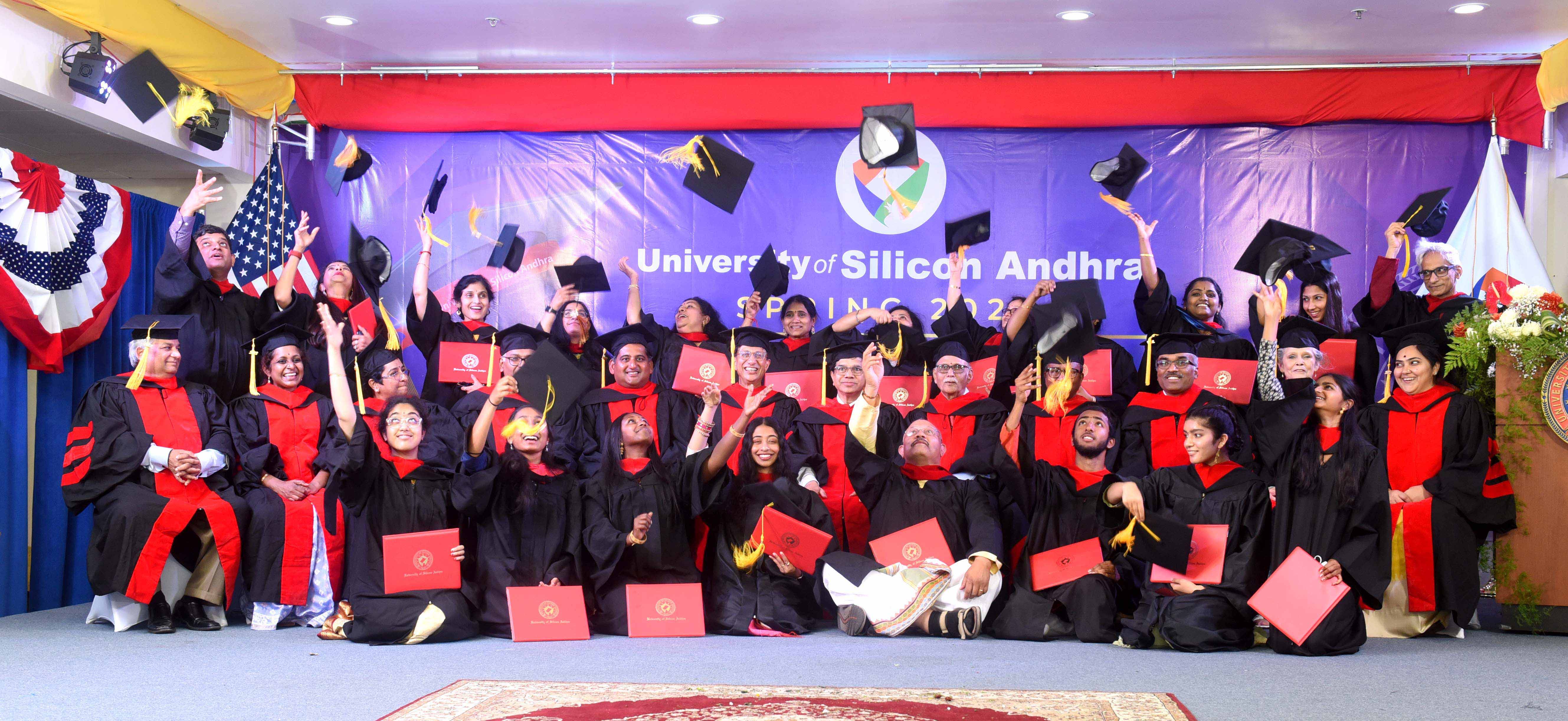3rd Convocation of the University of Silicon Andhra
[30 January 2021]
Commencement Speech by
Ambassador T.S. Tirumurti
Permanent Representative of India to the United Nations, New York
Prof. Anand Kuchibhotla, President of the University of Silicon Andhra,
Prof. Dr. Pappu Venugopala Rao, Chairman of the Board of Trustees,
Distinguished Trustees, Faculty and Staff,
Graduating Students and their Families and Friends,
Ladies and Gentlemen,
It is indeed a great privilege to attend the commencement and convocation event of the University of Silicon Andhra. I am truly grateful to Dr. Pappu Venugopala Rao and Prof. Anand Kuchibhotla for honouring me with their invitation to be the Commencement Speaker.
At the outset, I would like to extend my heartiest felicitations to all the graduating students of the 3rd Convocation and their families. You are indeed fortunate to have had an extraordinary education and experience in a University dedicated to the spread of traditional Indian thought, art and culture. The University, which calls itself Silicon Andhra, is certainly one which brings the best of Indian art forms to the Silicon valley and indeed to all parts of the United States:
– From the land of Annamacharya to the land of Aaron Copland, the great American composer;
– From the land of Raja and Radha Reddy, to the land of Martha Graham;
– From the land of Nannaya, Tikanna and Yerrapragada, to the land of Walt Whitman, T S Eliot and Robert Frost; and
– From the land of NT Rama Rao and Nagaiah, to the land of John Wayne and Humphrey Bogart.
You are all truly fortunate to have such an institution and benefit from it. As your Provost Prof. Raju Chamarthi says, the University of Silicon Andhra provides an opportunity to the students to actualise their potential as scholar–practitioners and to contribute to community with excellence, professionalism and integrity.
In India, we have always believed that without the blessing of our gurus, we cannot progress individually or collectively. As Bhagwat Gita says, approach your Acharyas and Gurus with reverence and humility to learn. So let me start by thanking all your Gurus, all the distinguished members of the Faculty. They have made you what you are.
I am also deeply honoured to release this unique Journal of the University of Silicon Andhra “Sastra” edited by none other than Dr. Pappu Venugopala Rao and other eminent members of the Editorial Board. This Journal is truly a great treasure of knowledge and I congratulate each one of the contributors for sharing their insights and wisdom for researchers and students around the world.
Dear Graduating students,
Your graduation is an indication of your mastery over the areas of your respective specialization, be it Kuchipudi, Carnatic Music, Bharata Natyam, Sanskrit or Telugu. And so, when you step out of the portals of this University, you truly become the Ambassadors for traditional Indian thought, art, dance, literature and culture.
After I joined the Indian Foreign Service in 1985, I remember what I was told by one of my seniors in the Foreign Service that when you sit for a meeting, the place-card in front of you says INDIA and not your name. And for the last 35 years or more, my place-card has always said INDIA and not my name. Similarly, when you graduate and step out into the wide world, you will be representing INDIA and not just yourself. Each one of you will be an Ambassador for Indian culture.
One of the most important distinction, which sets apart traditional Indian art and culture from all other cultures, is its spirituality and divinity. As Swami Vivekananda says the life-centre of Indian culture is spirituality. Every aspect of culture and art is seen as offering to the Almighty – as a form of worship.
But, what is even more extraordinary is that we see our entire existence, every action that we do in daily life as a form of worship as well. As ADI SHANKARA says in Soundarya Lahiri “Japo Jalpaha Shilpam Sakalamapi Mudra–Virachana” – My very speech is my prayers to You like Japa; all my actions and movement of my hands are for your worship as Mudras; all my walking and gait are circumambulation or Pradikshana; all my eating and drinking are offering to You as divine fire; my lying down is my prostration to You; my pleasures and enjoyments are acts of devotion to You or Seva. Consequently, every action of our daily life is in itself a dedication to the divine, or should I say, surrender to the divine, just as every traditional art form is a dedication to the Almighty.
That’s why Swami Vivekananda called India the “punyabhumi” – the land where humanity has attained its highest towards generosity, towards purity, towards calmness, above all, the land of introspection and of spirituality.”
Friends,
Varaha-upanishad gives the simile of an artist, who is practising her dance to an orchestra, and balancing a vessel on her head. She is focussed on the stability of the pot on her head and the balance in the same manner as a practitioner of Yoga always contemplates on the Brahman. Immersion and self-absorption in dance becomes a form of Yoga. Just as immersion and self-absorption in any traditional Indian art form becomes a form of Yoga.
I know I am talking to scholars and those who have mastery over music. But at the cost of repetition let me say this: Saint Thyagaraja, in his famous kriti NADA SUDHAA RASAM PILANU, describes music as Lord Rama in musical form, or alternatively, Lord Rama as the embodiment of music. He says that the nectar called Nada, which is the foundation on which Vedas, Puranas, Agamas and Shastras rest, has assumed human form as Lord Rama, and that the 7 Swaras are the bells of His Bow Kodanda; the Raga is His Bow; the note, tone and the Desya are the three strands of the bow string; temporal variations or Gatis of the Tala are the arrows; and the Sangatis are the words.
And don’t forget what the great BHARATA says in the “Palasruti”:
yā gatirvedaviduṣāṃ yā gatiryajñakāriṇām ।
yā gatirdānaśīlānāṃ tāṃ gatiṃ prāpnuyāddhi saḥ ॥ 27 ॥
All that ‘palan’ or ‘merits’ will be attained just through the knowledge of Natya Shastra.
When you all step out of the portals of this University, you will all go your own ways. But you will take with you all that you have learnt, you take with you an aspect of our spiritual existence which is very unique. But this deep understanding you have of our art and culture is not accessible to many, leave alone appreciated by them. It therefore becomes your responsibility, even your duty, to become a force multiplier for our tradition, heritage, art, culture and, most important of all, our spirituality. It does not matter whether you are an Indian or not. As long as you have immersed yourself in traditional Indian art and culture, you are part of us – part of that Oneness which binds all human beings.
As the well-known 13th century Persian Sufi Jalal ad-Din Rumi said: You are not a drop in the ocean; you are the entire ocean in a drop. So what you take with you when you leave this University is a segment of that ocean in a drop.
Friends,
It goes without saying that traditional art form is not static in time, nor static in form, nor even static in substance. Saint Thyagaraja even adopted English band music tunes to suit Carnatic Music. His well-known kriti “Vara Lila Gana Lola” in Shankarabharanam was deeply influenced by a popular English band tune. Many other composers, most prominent being of course Muthuswami Dikshitar, and choreographers have undertaken extraordinary innovations, which have preserved the core and essence of Indian spirituality and divinity while taking these art forms to an entirely different level. So don’t hesitate to take that leap of faith. And when it comes to innovation in the United States, I am confident that when the land of Balamurali Krishna mixes with the land of the American composer Phillip Glass, we will have an entirely new and unique voice reaching out to all humanity.
Friends,
India has made concerted efforts in the last few years to project our traditional practices, cultural heritage and our eternal values at the international level. In the context of the United Nations, you will all recall that Prime Minister Modi had proposed declaring 21st of June as the International Day of Yoga. This received extraordinarily support and now the ancient Indian wisdom of holistic approach to health is very much a part of international discourse. We also started a separate Ministry for our traditional forms of medicines – Ministry of AYUSH. The COVID pandemic has once again reinforced to the world the importance of having a holistic approach to a healthy living to ensure that such pandemics do not recur. In fact, the pandemic has helped all of us to draw on that inner strength and spiritualism which Indians have, to face the fall out boldly and with physical and mental resolve.
India also inscribed the 2nd of October as the United Nations International Day of Non-Violence to acknowledge and take forward the values and principles, which Mahatma Gandhi stood for. Today we solemnly observe his death anniversary. This year, we, in the Permanent Mission of India, celebrated both these UN events virtually with robust participation of the diplomatic community in New York. India is also working closely with other UN organizations like UNESCO for example, to not only register UNESCO heritage sites in India, but also inscribe our intangible heritage and others so that the diversity and richness of our heritage gets formal recognition at the international level. When we are in the UN Security Council over the next two years, I am confident that we will bring with us the great values that India has stood for over the years and centuries.
Ladies and Gentlemen
Let me say that at a personal level as well, it is a pleasure to speak to you all since my family has had very strong links with Andhra. My grandfather lived many years in Vishakapatnam and he was also briefly the Vice Chancellor of the Andhra University before Sir S Radhakrishnan took over. My dear cousin Gayathri Ramachandran of the Indian Administrative Service, whose cadre is Andhra, continues to live in Hyderabad to this day.
Allow me to conclude by thanking your Gurus, your parents and those who have stood by you to make sure you achieve what you have achieved. I once again thank Prof Anand Kuchibhotla and Prof Dr Pappu Venugopala Rao for inviting me to this august occasion.
I wish you all success and happiness.
Thank You
* * *
Twitter: https://twitter.com/ambtstirumurti/status/1355737085521629190?s=19
https://twitter.com/ambtstirumurti/status/1355912946757611520/photo/1



